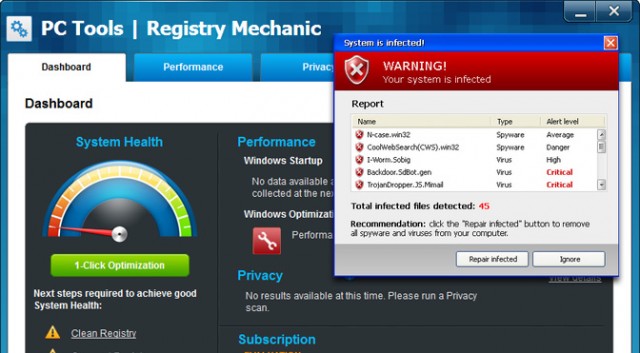Symantec Sued for Scaring Customers into Buying Their Products
A Washington state resident is suing Symantec for scaring consumers with fake error detections and convincing them to purchase their products in order to get rid of the alleged threats.
The class action complaint is filed in a Northern District of California court by James Gross and makes serious accusations regarding the company’s products, Forbes informs.
The plaintiff claims that Symantec intentionally develops scareware that finds errors and privacy risks on a user’s device even if they don’t exist. Furthermore, the products they advertise as being able to resolve the issues are not efficient at all, having “very little (if any) utility.”
Gross describes in detail a negative personal experience he had with Symantec software. In the complaint, he explained how he used the firm’s Registry Mechanic program which revealed that his computer had some “High Priority” issues which needed to be resolved.
After paying $29.99 (20 EUR) to fix the issues, the man hired a computer forensics expert who discovered not only that the errors found by the Symantec's application were not so “High Priority”, but also that the product always produces the scary results.
“The truth, however, is that the Scareware does not actually perform any meaningful evaluation of the user’s computer system, or of the supposed ‘errors’ detected by the software.
“Moreover, the Scareware does not, and cannot, actually perform the valuable tasks represented by Symantec through its websites, advertising, and in-software display screens,” the complaint reads.
The court document reveals that three specific products are targeted by the lawsuit: PC Tools Registry Mechanic, PC Tools Performance Toolkit, and Norton Utilities.
Symantec was accused some time ago of forging a report in which they claimed that cybercrime was costing global economy even more than the illegal drug trade. At the time, many companies accused the security solutions provider of commissioning studies that would bring it financial benefits.
The plaintiff claims that Symantec intentionally develops scareware that finds errors and privacy risks on a user’s device even if they don’t exist. Furthermore, the products they advertise as being able to resolve the issues are not efficient at all, having “very little (if any) utility.”
Gross describes in detail a negative personal experience he had with Symantec software. In the complaint, he explained how he used the firm’s Registry Mechanic program which revealed that his computer had some “High Priority” issues which needed to be resolved.
After paying $29.99 (20 EUR) to fix the issues, the man hired a computer forensics expert who discovered not only that the errors found by the Symantec's application were not so “High Priority”, but also that the product always produces the scary results.
“The truth, however, is that the Scareware does not actually perform any meaningful evaluation of the user’s computer system, or of the supposed ‘errors’ detected by the software.
“Moreover, the Scareware does not, and cannot, actually perform the valuable tasks represented by Symantec through its websites, advertising, and in-software display screens,” the complaint reads.
The court document reveals that three specific products are targeted by the lawsuit: PC Tools Registry Mechanic, PC Tools Performance Toolkit, and Norton Utilities.
Symantec was accused some time ago of forging a report in which they claimed that cybercrime was costing global economy even more than the illegal drug trade. At the time, many companies accused the security solutions provider of commissioning studies that would bring it financial benefits.
Source:Softpedia

